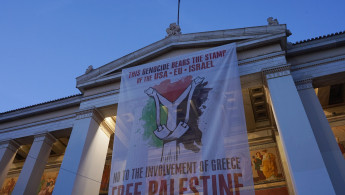Greece to deport nine European nationals over pro-Palestinian protest
Nine protesters from Germany, Britain, France, Italy and Spain, arrested during a pro-Palestinian demonstration at the University of Athens School of Law last week are set to be deported from Greece, their lawyers said on Monday.
Police last week detained a total of 28 Greek and foreign protesters occupying the building, on charges including disrupting the operation of a public entity and assistance in damaging foreign property, according to court documents.
The protesters have denied any wrongdoing.
Evidence included leaflets, Palestinian flags, two smoke flares, gas masks, helmets, paint cans and banner poles, along with a statement uploaded on a website in Greek and English urging others to join the protest, according to the documents.
The Greek protesters were released pending trial on May 28 but the nine foreign nationals - one man and eight women, aged 22 to 33 - remained in custody pending an administrative decision on their deportation.
The foreigners' lawyers said in a statement that deportation orders had been issued, which would prevent the defendants attending their own trial.
Lawyers Ioanna Sioupouli and Anny Paparoussou said that their clients who live and work in Greece planned to appeal.
Lawyer Vassilis Papadopoulos, representing a 33-year-old Spaniard, called the decision "arbitrary and illegal".
Pro-Palestinian supporters have staged several protests in Greece since Israel's war with Hamas began in Gaza in October.
Greece in 2019 scrapped legislation that prohibited police from entering universities, as the conservative government said it was used as a cover for lawlessness.
The Academic Sanctuary Law, a legacy of the crackdown on a 1973 student revolt by the military junta of the time, was designed to protect protesting students and freedom of ideas. Critics decried its abolition as a clampdown on democracy.
(Reuters)





 Follow the Middle East's top stories in English at The New Arab on Google News
Follow the Middle East's top stories in English at The New Arab on Google News


